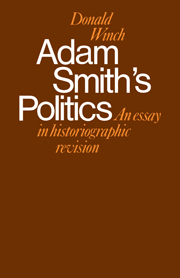Book contents
- Frontmatter
- Contents
- Acknowledgements
- Abbreviations
- 1 Introduction: the problem – the liberal capitalist perspective
- 2 Republicanism and sceptical Whiggism
- 3 Hutcheson and Smith: Real Whig versus sceptical Whig
- 4 Commerce, liberty and justice
- 5 Martial spirit and mental mutilation
- 6 A ruinous expedient
- 7 The present disturbances
- 8 Conclusion
- Bibliography
- Index
- Title in the series
2 - Republicanism and sceptical Whiggism
Published online by Cambridge University Press: 03 February 2010
- Frontmatter
- Contents
- Acknowledgements
- Abbreviations
- 1 Introduction: the problem – the liberal capitalist perspective
- 2 Republicanism and sceptical Whiggism
- 3 Hutcheson and Smith: Real Whig versus sceptical Whig
- 4 Commerce, liberty and justice
- 5 Martial spirit and mental mutilation
- 6 A ruinous expedient
- 7 The present disturbances
- 8 Conclusion
- Bibliography
- Index
- Title in the series
Summary
Those political theorists and historians who are committed, for one present-minded reason or another, to the enterprise of constructing a genealogy of liberal or bourgeois individualism which is continuous from Locke to the nineteenth century and beyond have suffered a major casualty as a result of recent research on eighteenth-century political thought and ideology. That casualty is no less a figure than Locke himself, the ‘founder’ of liberal constitutionalism. The following statements by Leslie Stephen neatly encapsulate, albeit in caricature, the view that has been exploded by recent scholarship.
Happy is the nation which has no political philosophy, for such a philosophy is generally the offspring of a recent, or the symptom of an approaching, revolution. During the quieter hours of the eighteenth century Englishmen rather played with political theories than seriously discussed them.
Locke expounded the principles of the Revolution of 1688, and his writings became the political bible of the following century.
It is now some years since the painstaking detective work of Peter Laslett on the dating of the composition of the Two Treatises of Government effectively disposed of the idea that Locke wrote in order to justify the Glorious Whig Revolution. Further research on Locke, most notably by John Dunn, has shown the predominantly theological character and restricted local engagement of Locke's political sympathies and writings. Far from acting as the bible for a complacent century which lacked an autonomous interest in political theory, recent scholarship converges on the conclusion that Locke's Two Treatises was of strictly limited significance to many of the most lively as well as profound developments which took place in Anglo-American political thought during the eighteenth century.
- Type
- Chapter
- Information
- Adam Smith's PoliticsAn Essay in Historiographic Revision, pp. 28 - 45Publisher: Cambridge University PressPrint publication year: 1978

